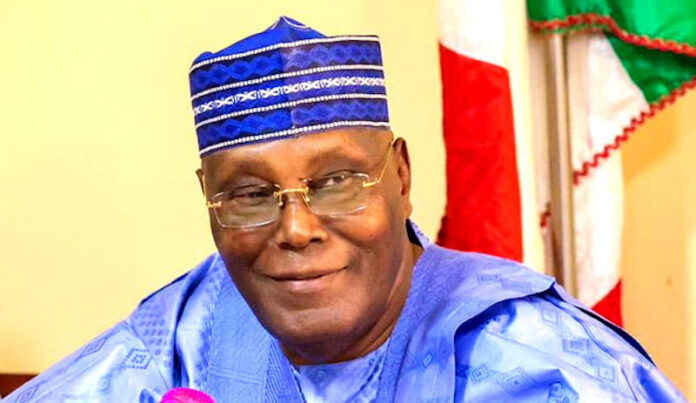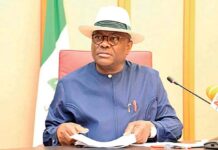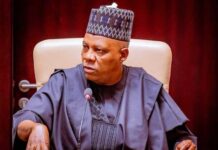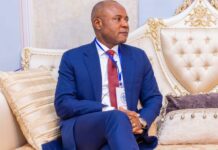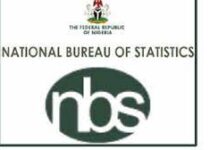Presidency: Nigeria Would’ve Deteriorated Under You
CHIGOZIE AMADI
Former Vice President Atiku Abubakar and the presidency, yesterday, squabbled over the state of the nation, especially the tottering economy.
Atiku, the Peoples Democratic Party (PDP) 2023 presidential candidate, who took a swipe at President Bola Tinubu’s leadership, advising him to eat the humble pie and adopt some of the policies in his manifesto in order to turn around the economy for good.
But the presidency, in its response, said if Atiku had won the 2023 presidential election, which held March last year, Nigeria would have been worse under his watch.
In a long statement personally signed, Atiku said he had been inundated with questions as to what he would have done differently if he was at the helm of affairs of the country.
He stated, “I am not the president, Tinubu is. The focus should be on him and not on me or any other. I believe that such inquiries distract from the critical questions of what Tinubu needs to do to save Nigerians from the excruciating pains arising from his trial-and-error economic policies.
”However, I understand and appreciate the challenges faced by citizens in seeking alternatives to what is not working for them. I hope Tinubu and members of his administration are humble enough to borrow one or two things from our ideas in the interest of the Nigerian people.
“I would now go ahead and articulate some of our ideas that would have had the potential to transform our beloved country,” he said.
On subsidy removal, Atiku pointed out that he has always advocated for the removal of subsidy on petrol because its administration had been mildly put, opaque with so much scope for arbitrariness and corruption.
He insisted that mind boggling rent profit from oil subsidy accrued to the cabals in public institutions and the private sector.
”I would have prioritised the following: First, tackling corruption. Fighting corruption should have commenced with the repositioning of the Nigerian National Petroleum Company Limited (NNPC), which is a huge beneficiary of the status quo.
“Its commitment to reform and capacity to implement and enforce reforms is suspect. The subsidy regime has provided an avenue for rent seeking, and the NNPC and its guardians will be threatened by reforms.”
The former vice president added, “Second, paying particular attention to Nigeria’s poor refining infrastructure. We are by far the most inefficient Organisation of Petroleum Exporting Countries (OPEC) member country in terms of both the percentage of installed refining capacity that works and the percentage of crude refined.
“We would’ve commenced the privatisation of all state-owned refineries and ensure that Nigeria starts to refine at least 50 per cent of its current crude oil output. Nigeria should aspire to export 50 per cent of that capacity to ECOWAS member states.”
He stated that he would have adopted a gradualist approach in the implementation of the subsidy reforms, highlighting that subsidies would not have been removed suddenly and completely.
Atiku said during his time as vice president, the government adopted a gradualist approach and had completed phases one and two of the reform before the tenure ended.
He stated, “The incoming administration in 2007 abandoned the reforms, unfortunately. The majority of the countries that review or rationalise subsidy payments adopt a gradualist approach by phasing price increases or shifting from universal to targeted approach (Malaysia, 2022 and Indonesia, 2022 -2023).
“In many European Union (EU) economies, complete withdrawal often takes five years to effect. The gradualist approach allows for adjustments, adaptation and minimises disruptions and vulnerability.”
Atiku said he would have implemented a robust social protection programme that will support the poor in navigating the cost of living challenges arising from reform implementation.
He explained, “We would’ve invested the savings from subsidy withdrawal to strengthen the productive base of the economy through infrastructure maintenance and development; to improve outcomes in education and healthcare delivery.
“To improve rural infrastructure and support livelihood expansion in agriculture; and develop the skills and entrepreneurial capacity of our youth in order to enhance their access to better economic opportunities.”
On a general level, Atiku said he would have planned better and more robustly, stating that his reforms would have benefited from more adequate preparation; more sufficient diagnostic assessment of the country’s conditions; more consultations with key stakeholders; and better ideas for the final destination.
According to him, ”We would have been guided by my robust reform agenda as encapsulated in ‘My Covenant With Nigerians’, my policy document that sought to, among others, protect our fragile economy against much deeper crisis by preventing business collapse; our document had spelt out policies that were consistent and coherent.
”We would have sequenced my reforms to achieve fiscal and monetary congruence. Unleashing reforms to determine an appropriate exchange rate, cost-reflective electricity tariff, and PMS price at one and the same time is certainly an overkill.”
He said the bullish money tightening spree by the Central Bank of Nigeria (CBN) was also an issue. He stressed that as importer of premium motor spirit (PMS) and other petroleum products, removing subsidy on these products without a stable exchange rate was counterproductive.
Atiku stated, “We would have been more strategic in our response to reform fallout. We would not over-estimate the efficacy of the reform measures or underestimate the potential costs of reforms. I would recognise that reforms could sometimes fail.
“I would not underestimate the numerous delivery challenges, including the weaknesses of our institutions, and would work assiduously to correct the same. I would, as a responsible leader, pause, reflect, and where necessary, review implementation.”
Atiku said he would have led by example.
He added, ”Any fiscal reform to improve liquidity and the management of our fiscal resources must first eliminate revenue leakages arising from governance, including the cost of running the government and the government procurement process. I (and members of my team) would not have lived in luxury while the citizens wallow in misery.
”We would have communicated more effectively with the people, with civility, tact, and diplomacy. Transparent communication with the public is essential to build public trust, which in turn is important to ensure that the public understands what the government is doing.
”We would have consulted more with all stakeholders to learn, negotiate, adapt, and modify, among other policy goals. We would have demonstrated more empathy. My Reforms would wear a human face.
“We would have been more strategic in the design and implementation of reform fallout mitigating measures. I would not run a ‘palliative economy’ yet, we would have a robust social protection programme that will offer genuine support to the poor and vulnerable and provide immediate comfort and security to enable them to navigate the stormy seas.”
Besides, Atiku said he would have undertaken extensive reforms of public sector institutions to maximise reform impact, with special focus on security. He said he would have commenced from day one on reform of the security institutions with improved funding, and enhanced welfare.
He stated that his policy document had spelt out a special presidential welfare initiative for security personnel, and he would have adopted alternative approaches to conflict resolution, such as diplomacy, intelligence, improved border control, deploying traditional institutions, and good neighbourliness.
In addition, Atiku said he would have launched an Economic Stimulus Fund (ESF), with an initial investment capacity of approximately $10 billion to support small businesses across all economic sectors.
Alongside the ESF, he stated that he would have launched a uniquely designed skills-to-job programme that targets all categories of youth, including graduates, early school leavers as well as the massive numbers of uneducated youth currently not in education, employment, or training.
He said, “To underscore our commitment to the development of infrastructure, an Infrastructure Development Unit (IDU) directly under the President’s watch would have come into operation.
“The IDU will have a coordinating function and a specific mandate of working with the MDAs to fast track the implementation of the infrastructure reform agenda within the framework provided herein.
“The IDU will hit the ground running in putting the building blocks for our private sector driven Infrastructure Development Fund (IDF) of approximately $25 billion.
”To engender fiscal efficiency and promote accountability and transparency in public financial management, we would have committed to a review of the current fiscal support to ailing state-owned enterprises. We would’ve also begun a process review of government procurement processes to ensure value-for-money and eliminate all leakages.
”We would have initiated a review of the current utilisation of all borrowed funds and ensured that they were deployed more judiciously.”
On foreign exchange reforms, Atiku said he also made a commitment to reform the operation of the foreign exchange market, and eliminate multiple exchange rate windows.
He stated, “The system only served to enrich opportunists, rent-seekers, middlemen, arbitrageurs, and fraudsters. A fixed exchange rate system was out of the question because it would not be in line with our philosophy of running an open, private sector friendly economy.
“On the other hand, given Nigeria’s underlying economic conditions, adopting a floating exchange rate system would be an overkill. We would have encouraged our Central Bank to adopt a gradualist approach to FX management. A managed-floating system would have been a preferred option.”
Presidency: Nigeria Would’ve Deteriorated Under Atiku
However, the presidency, in a statement titled, “Our Initial Response to Alhaji Atiku Abubakar,” by the Special Adviser to the President on Information and Strategy, Bayo Onanuga, maintained that if Atiku had won the presidential poll last year, Nigeria would have been worse for it.
It explained that Tinubu inherited a country with a myriad of grave challenges, adding that in the over one year of the Tinubu administration, it has succeeded in correcting past mistakes made by President Olusegun Obasanjo, under whom Atiku served as Vice President from 1999 to 2007.
The presidency also accused Atiku of supervising a suspicious privatisation programme as vice president, alleging that Atiku lost the 2023 presidential poll principally because he promised to sell NNPC and other assets to his friends.
The statement said, “We have just read a statement credited to former vice president, Alhaji Atiku Abubakar, in which he tried to discredit President Bola Tinubu’s economic reform programmes while pushing his untested agenda as a better alternative.
“First, Alhaji Atiku’s ideas, which lacked details, were rejected by Nigerians in the 2023 poll. If he had won the election, we believe he would have plunged Nigeria into a worse situation or run a regime of cronyism.
“Abubakar lost the election partly because he vowed to sell the NNPC and other assets to his friends. Nigerians have not forgotten this, nor would they be comforted by Atiku’s antecedents when he ran the economy in the first term of President Olusegun Obasanjo’s government between 1999 and 2003.
“As vice president, Atiku supervised a questionable privatisation programme. He and his boss demonstrated a lack of faith in our educational system, and both went to establish their universities while they allowed ours to flounder.”
The presidency added, “Talk is cheap. It is easy to pontificate and deride a rival’s programmes even when there are irrefutable indices that the economic reforms yield positives despite the temporary difficulties.
“Despite the futile attempt to hoodwink Nigerians again in his statement, it is gratifying that the former Vice President could not repudiate the economic reforms pursued by the Tinubu administration because they are the right things to do.
“His advocacy for a gradualist approach only showed that he was not in tune with the enormity of problems inherited by President Tinubu. It is so easy to paint a flowery to-do list. It is expected of an election loser.
“President Tinubu met a country facing several grave challenges. Fuel subsidies were siphoning away enormous resources we could ill afford, and there was criminal arbitrage in the forex market.”
The statement also said, “No leader worth his name will allow these two economic disorders to persist without moving to end them surgically.
“While advocating for gradual reforms may sound appealing, Tinubu took measures that should have been taken decades ago by Alhaji Abubakar and his boss when they had the opportunity.
“Alhaji Abubakar calls for empathy and a human face to reforms. We have no problem with this as it resonates well with our administration’s focus. President Tinubu has consistently emphasised the need for compassion and protection of the most vulnerable.
“The administration has prioritised social safety nets and targeted support for those affected by recent economic transitions.”



